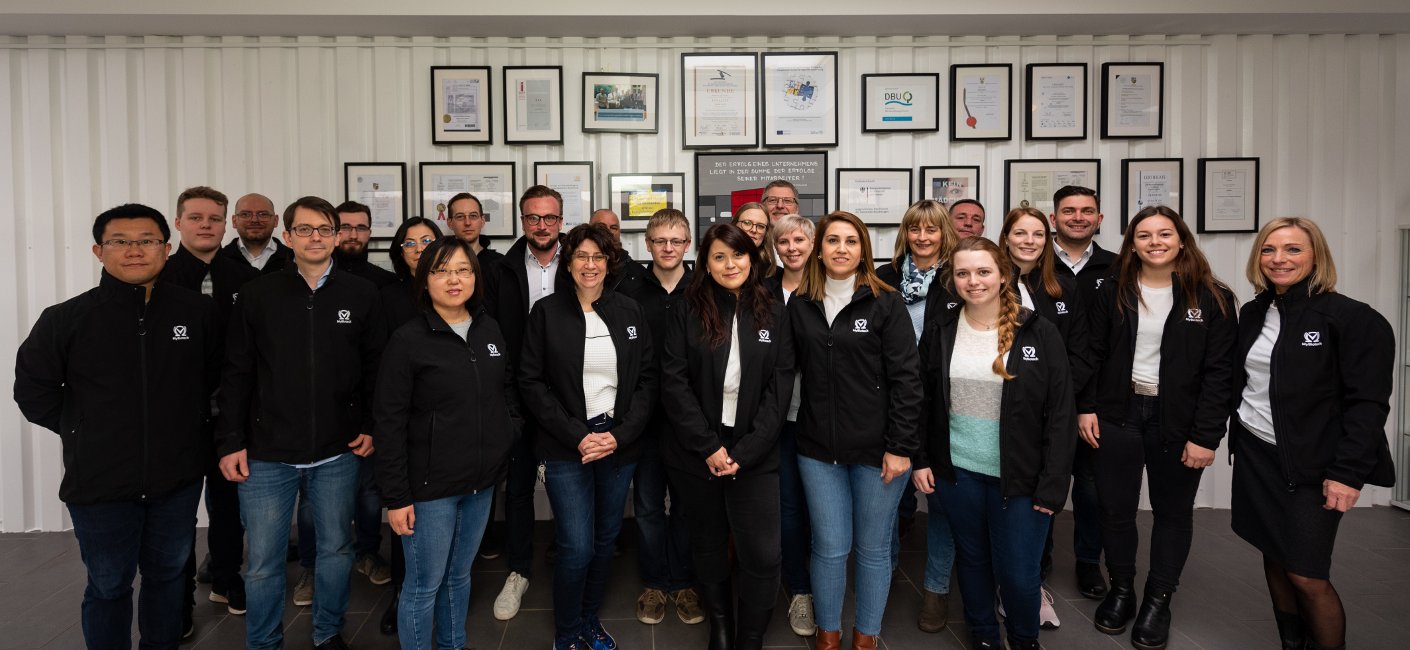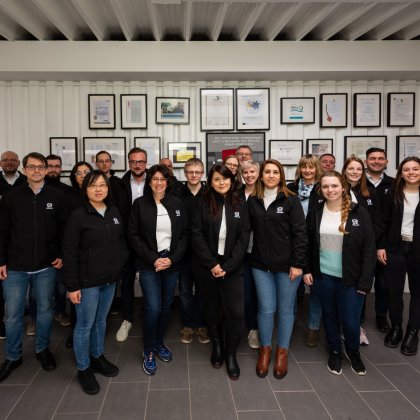MyBiotech
Dr Nazende Günday-Türeli, Head of R&D Pharma
MyBiotech is a contract development and manufacturing organization (CDMO) aiming to efficiently introduce innovative biotechnological and pharmaceutical products to the market. While the biotechnological division focuses on developing green technologies, e.g. for the sustainable production of omega-3 fatty acids from algae, the pharmaceutical division specializes on developing Good Manufacturing Practice (GMP) production methods for both the manufacturing and processing of particulate systems.
Established in 2020 after the merger of equals between the life science companies MyBiotech GmbH and MJR PharmJet GmbH, the company currently employs more than 40 people from different professional backgrounds, from pharmacy and chemistry to biotechnology and engineering. With 120 cooperation partners, MyBiotech is a leading partner in biotechnology and pharmaceutical R&D projects in Europe and beyond.
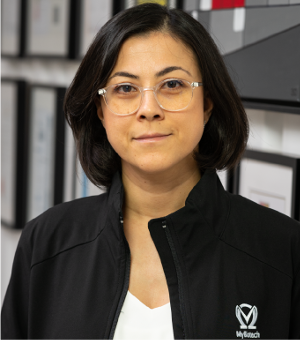
„Introducing high-quality technologies, products or services and the necessary infrastructure increases the attractiveness of the Saarland for national and EU markets. EU funded collaborative projects all provide the relevant expertise, equipment and infrastructure to realise that aim in a short timeframe and in an affordable way.“
Dr Nazende Günday-Türeli, Head of R&D Pharma
What is the story behind MyBiotech? How did it start out and how did it evolve into what it is now?
MyBiotech GmbH was founded in December 2016 as a lab company for biotechnological research and development. The aim was to develop biotechnological processes for the production of natural substances. The primary focus was on the biotechnological production of omega-3 fatty acids from algae and yeast. Very first projects were also focusing on the production of galactose, which is commonly known as ‘brain sugar’, from industrial side streams.
In 2020, MyBiotech GmbH fully merged with the pharmaceutical manufacturing company MJR PharmJet GmbH, and both companies decided to continue operating under the name MyBiotech. The merger aimed to expand the portfolio in the pharmaceutical sector and bring the expertise and capacities of both companies under one roof. Thus, two divisions were born: MyPharma, which focuses on developing production processes for manufacturing pharmaceutical nanoparticles, aiming to improve the formulation of pharmaceuticals using both conventional and innovative methods, and MyBiotech, which focuses on innovative solutions for biotechnological upstreaming and downstreaming processes and natural products.
MyBiotech’s novel particle formulations are designed to maximize the benefits of the particulate systems based on their application. MyBiotech works with microreactors for both biotechnology and pharmaceuticals. In the biotechnology sector, MyBiotech uses these reactors to first break down microorganisms (bacteria, yeast, algae) and, in a second step, to extract appropriate products (e.g. omega-3 fatty acids, but also antioxidants, proteins, etc.).
In the pharmaceutical sector, microreactors are used to continuously produce pharmaceutical nanoparticles. The microreactor technology is constantly improved and optimized by MyBiotech’s engineering department, and corresponding patents are pending.
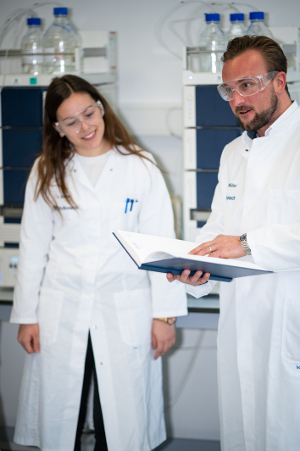
And where is the company headed?
MyBiotech is currently working on several customer projects as a service provider in both sectors. The prerequisites for establishing the processes, such as optimizing the reactors and acquiring the relevant know-how, were already set up in previously completed and in ongoing R&D projects. Furthermore, MyBiotech designs and constructs such systems for customers. The continuous production facilitates an unlimited industrial scale up. MyBiotech’s services shorten the time to market period by integrating developed particulate systems into existing down processing methods.
Most importantly, MyBiotech is planning a huge leap forward by setting up our own production facilities in both industry sectors through appropriate investments. This includes the production of vegan omega-3 fatty acids from algae as well as the production of pharmaceutical nanoparticles, and the production of clinical test samples under GMP conditions.
In which Horizon 2020 projects has MyBiotech been involved? What is or was its role in these projects?
MyBiotech has participated in different capacities in numerous research projects within the Horizon 2020 framework programme:
Phoenix (953110): Pharmaceutical Open Innovation Test Bed for Enabling Nano-pharmaceutical Innovative Products
Role: Scientific Coordination
Bio2Brain (956977): Nose-to-Brain Delivery of Biopharmaceutics for the therapy of central nervous system diseases: A design-based approach for efficient drug delivery systems
Role: Development of particulate formulations for drug delivery of biopharmaceuticals
iFERMENTER (79050): Conversion of forestry sugar residual streams to antimicrobial proteins by intelligent fermentation
Role: Galactose extraction from residual stream
NanoSTEM (764958): New nanomaterials for neural stem cells drug delivery
Role: Beneficiary – ESR training for novel pharmaceuticals loaded nanoparticles to control the biological activity of neural stem cells
nTRACK (761031): Multimodal nanoparticles for structural and functional tracking of stem cell therapy on muscle regeneration
Role: Scale up and GMP manufacturing
N2B-Patch (721098): Nose to Brain Delivery of NG-101 via the Olfactory Region for the Regenerative Treatment of Multiple Sclerosis Using Novel Multi-functional Biomaterials Combined with a Medical Device
Role: Scale up and GMP manufacturing
npSCOPE (720964): The nanoparticle-scope: a new integrated instrument for accurate and reproducible physico-chemical characterisation of nanoparticles
Role: Large-scale NP manufacturing for test cases
What are the advantages of participating in an EU project?
It is a hard road from developing an idea to successful market launch. In most cases, a multidisciplinary team is required. MyBiotech has identified the challenges of such endeavours and employs a highly qualified, young and dynamic team coming from different backgrounds, from engineering to nanomedicine, to facilitate the development phases. However, promoting the development of innovative products or technologies is not easily achieved in companies of SME size without collaborating with other industrial or academic partners with similar interests. There is no need to mention that first-hand access to innovative research activities and results is a great opportunity for SMEs to shape their product pipelines and future research activities.
Additionally, EU projects strengthen the economic flexibility of SMEs and how innovative they are. Through EU projects, SMEs are enabled to organically gain new partners with the required skills. The financial burden and thus the high risk that an SME has in implementing innovative technologies and products cannot, however, be neglected. Developing new technologies, products or concepts requires a large financial expenditure, especially within the pharma and biotech industries due to a strictly regulated environment. EU projects that fully or partially cover expenditures encourage SMEs to undertake more high-quality R&D, to take more risks and to increase their competitiveness at the company level but also at a national and European level.
Are there any particular challenges?
In the beginning, creating a network that best matches the company’s interest groups and focus areas is quite time-consuming. However, once the network is established and potential partners and responsibilities are identified, the creation of consortia gets easier. Additionally, once the community recognizes your skills and the services that you can offer, networks expand significantly through invitations and contacts initiated by other parties.
After establishing a consortium, taking a large number of ideas and consolidating them into a feasible work plan becomes tricky. This is where multidisciplinary principal investigators (PI) with a wide range of know-how come into play. Such PIs can channel the best contributions from the partners, all of whom come from different backgrounds, into a single message. It goes without saying, that presenting one’s skills as well as the quality of the proposed project within a limited number of pages pose further challenges. This requires a very good understanding of project prerequisites, implementation strategies and of project management, as well as good knowledge of EU policies.
At MyBiotech, those problems are met with a dedicated PI from both the pharma and biotech department. These PIs work intensively on identifying calls of interest and aligning them with the company’s project and product pipelines. They also actively participate in proposal drafting. This is very efficient during the implementation phase in case of a positive evaluation.
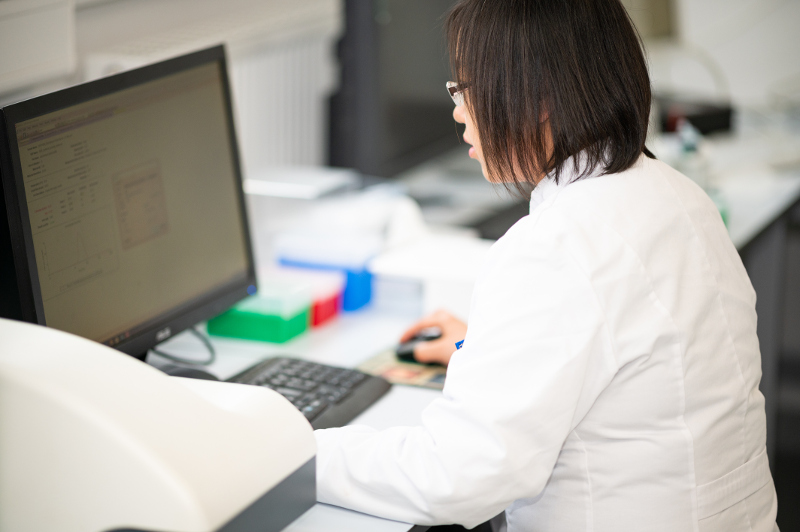
EU funds give MyBiotech the flexibility to invest in the research and development of innovative areas. The funds are used directly to generate efficient and high-quality results. To that end, personnel costs are the most cost intensive category at MyBiotech. Depending on the nature of the project and its duration, the company invests heavily in its personnel and employs people with relevant qualifications.
The generated results and know-how directly contribute to advancing the company within the funded topic as well as the line of work involved. In this way, EU funding indirectly helps keep the company in line with the current state-of-the-art.
Why did MyBiotech decide to apply for EU funding?
MyBiotech was already actively participating in national collaboration projects with highly competent partners from academia and industry. However, these projects were usually at regional level and the number and category of topics for the calls were very limited.
MyBiotech was also involved in projects during the FP7 framework programme, which met the company’s expectations in an EU funded project, in that it allowed it to do research within its own areas of interest. Thus, MyBiotech decided to invest time and energy into submitting proposals for the Horizon 2020 framework programme. Here, more emphasis was given to taking the output of the FP7 projects to a higher Technology Readiness Level (TLR).
MyBiotech was well positioned for the Horizon 2020 framework, as this programme was more focused on industrialization, scale up and large-scale projects with an adequate proof of concept. The very skills and services MyBiotech is specialized in. Taking this into account, target calls in Horizon 2020 were identified early on as well as promising projects within these calls that MyBiotech sought to be involved with. In time this increased the company’s visibility and led to other research groups and companies asking MyBiotech to join their consortia.
What was the application procedure like? Was MyBiotech well equipped to handle the requirements and did it receive support from outside?
When just starting out, the EC’s online funding and tenders portal (Single Electronic Data Interchange Area - SEDIA) can be quite time-consuming to properly manage. However, the system offers a great online user manual. The team involved in the application procedure at MyBiotech was able to benefit from the guidelines and how-to sections to a great extent. And since a fair amount of previous experience existed due to its participation in projects as a consortium partner, the company was well equipped for the activities and requirements needed to coordinate large multinational projects when the time came. Additionally, the Route2025 team provided help with specific questions and further support.
Do you have any tips for other Saarland SMEs interested in participating in an EU funded collaborative project? Introducing high-quality technologies, products or services and the necessary infrastructure increases the attractiveness of the Saarland for national and EU markets. EU funded collaborative projects all provide the relevant expertise, equipment and infrastructure to realise that aim in a short timeframe and in an affordable way. Additionally, such projects also allow one to be one of the first few parties to have access to Key Enabling Technologies (KETs). The KETs offer the company an improved market access and cost effectiveness.
When nano-pharmaceuticals and biotechnological products are considered, the lack of a consolidated regulatory framework for such products means that the industry must invest huge resources to identify the regulatory requirements in order to comply with them. From a regulatory perspective, working together with institutes and organisations which are shaping the regulatory requirements offers a better understanding of the prerequisites to market entry as well as an opportunity to be part of those organisations shaping the regulatory environment. Therefore, Saarland SMEs have the chance to identify the most efficient way to fulfil the data-requirements for any given type of product or technology, in close collaboration with regulators, and incorporate them in innovative, user-friendly, efficient and intelligent testing strategies.
At MyBiotech, we believe that our contribution to such projects increases the attractiveness of the Saarland as a location of choice to carry out advanced medical, biotechnological and nano-pharmaceutical research and product development as well as production. As the number of SMEs participating in such projects increases, the competitiveness of the Saarland will also increase.
Does being an innovative SME located in the Saarland have its advantages? What are they?
Being located in the comparatively small state of the Saarland, the local government was always of great help to MyBiotech, not only for support but also for establishing its infrastructure. That is always a great advantage in comparison to larger states. Logistically speaking, the Saarland is located very closely to many hubs in Europe, such as Frankfurt in Germany, Luxembourg and France.
Also, MyBiotech collaborates closely with the Helmholtz Institute and different departments of the Saarland University. It is a very valuable opportunity to be so close to such a competent academic environment and to be able to collaborate with them.
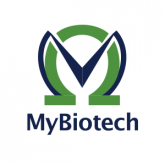
https://mybiotech.de
d.mueller@mybiotech.de
MyBiotech’s dynamic team consists of highly qualified international members from a variety of backgrounds including pharmacy, chemistry, biology, biotechnology and engineering. Open to all aspects of innovation, the company culture welcomes new ideas from its various teams and looks to synergize the strengths of each team with one another.
